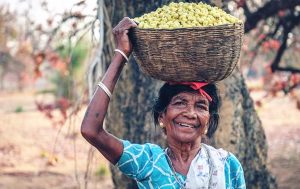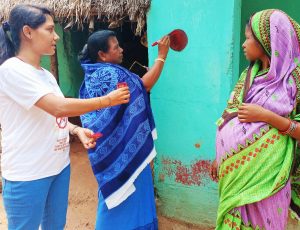ADVOCACYNET 406, April 25, 2024
Neem Oil Start-up Seeks to Protect Tribal People in India Against Malaria

Ready for the big grind: Fifty tribal women in Odisha State will collect and process over a ton of Neem seeds this year.
In an effort to reduce the threat from malaria, a leading NGO in the Indian state of Odisha has launched a start-up to help tribal villagers produce oil from the Neem tree for use as a mosquito repellent.
The start-up was unveiled today in Daspalla village on the occasion of World Malaria Day by Jeevan Rehkha Parishad (“Lifeline”). It will be funded by The Advocacy Project and managed by tribal women, who will be selected at today’s ceremony.
Speaking by Zoom from Odisha recently Dr Manu Mishra, the founder of JRP, said that tribal people in the state have long used Neem leaves to keep mosquitoes at bay. The new start-up will help them to build on this traditional knowledge and extract oil from Neem seeds, for sale and as a form of protection at home. The oil will carry the brand name of Neemola, he said.
The Neem start-up is the latest tactic employed by JRP in a broad-ranging campaign to curb malaria among tribal villagers in Odisha State, where cases jumped from 23,770 in 2022 to 41,971 last year – higher than any other state in India.
The trend in Odisha mirrors a global surge. According to last year’s World Malaria Report, cases of malaria worldwide increased from 233 million in 2019 to 249 million in 2022, a year in which the disease claimed an estimated 608,000 lives.
JRP began work on malaria in January last year with an intensive campaign of prevention and referrals in ten tribal villages that brought cases down from 127 a month to zero in December. JRP has declared the ten villages “malaria-free” and is seeking funds to extend the program to other areas. (Click here to read more about JRP’s model).
Surajita Sahu, a field officer at JRP who will direct the Neem start-up, said the idea emerged from the malaria campaign. “We noticed that tribal communities burn Neem tree leaves and seeds to create mosquito-repelling smoke,” she said. “They also apply Neem oil to their skin while sleeping as a natural deterrent.”
The problem, explained Ms Sahu, is that the oil is not produced in the villages and costs 450 rupees ($5.40) a liter in the market. This is equivalent to a week’s wages for many tribal families.
In an effort to change this, JRP will invite 50 women from five villages to form a cooperative and collect a thousand kilos of Neem seeds by October, when the Neem season ends. The women will receive 50 rupees (60 US cents) for each kilo. Over sixty women have already expressed interest.
The seeds will be ground into oil by an oilseed press at the JRP sub-office in the village of Khalamada. Ms Sahu will train ten members of the cooperative to run the machine.
Ms Sahu said that the project hopes to fill 800 bottles of Neemola oil this year. Two hundred bottles will be shared between pregnant women, families with young children, elderly, and villagers with a disability. The rest will be sold at markets, where they are expected to fetch around 30,000 rupees ($398) to be invested in the project and cooperative.
Any leftover oil will be sold to light candles during the popular Diwali Hindu Festival of Lights in November. When the supply of Neem seeds is exhausted, the cooperative will use the press to make mustard oil and grind wheat flour.
Biraj Krishna, JRP’s Assistant Director, predicted that cooperative members could earn up to 4,000 rupees ($48) a month. “This would be a lot for women who have never been employed,” he said. “They would also learn new skills and gain from working together in a team.”
The environmental impact could also be significant, said Dr Mishra: “At present Neem seeds are left on the ground to rot. As villagers come to see the trees as a source of income they will manage this natural resource carefully.” He added that if the start-up meets its goals, JRP could eventually work with the local government to plant Neem saplings in the forests.
Dr Mishra said that the start-up has already drawn praise for its inventiveness from government officials, and that an expert from the Odisha University of Agriculture and Technology (OUAT) in Bhubaneswar will attend today’s ceremony to offer technical advice.
The Neem start-up could also attract attention at the international level, as agencies worry about the global surge in malaria. According to the 2023 World Malaria Report, the surge has been exacerbated by extreme weather in countries such as Pakistan, where cases increased five-fold to 2.6 million after devastating floods in 2022. Countries are also turning away from chemical insecticides like DDT which is largely banned.
This in turn may spark interest in plant-based approaches like Neemola and encourage efforts to tap into the traditional knowledge of indigenous communities. As Dr Tedros Adhanom Ghebreyesus, Director-General of the World Health Organization (WHO) noted in the 2023 report: “With the added threat of climate change, sustainable and resilient malaria responses are needed now more than ever.”
The Advocacy Project has committed $12,000 to the Neem start-up and recruited Adin Becker, a graduate student at Harvard University, to serve as a Peace Fellow at JRP this summer.

JRP’s malaria campaign targets vulnerable tribal villagers, particularly pregnant women. Here Surajita Sahu, who will manage the Neem start-up for JRP, watches as Musoumi, an Accredited Social Health Activist (ASHA), marks the house of Mita with red paint.
